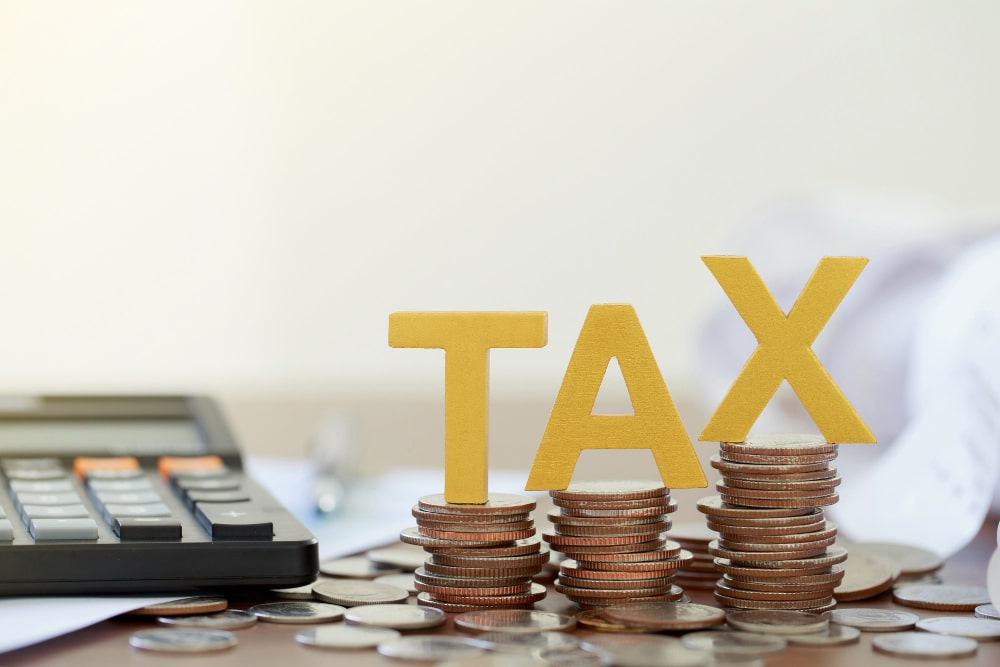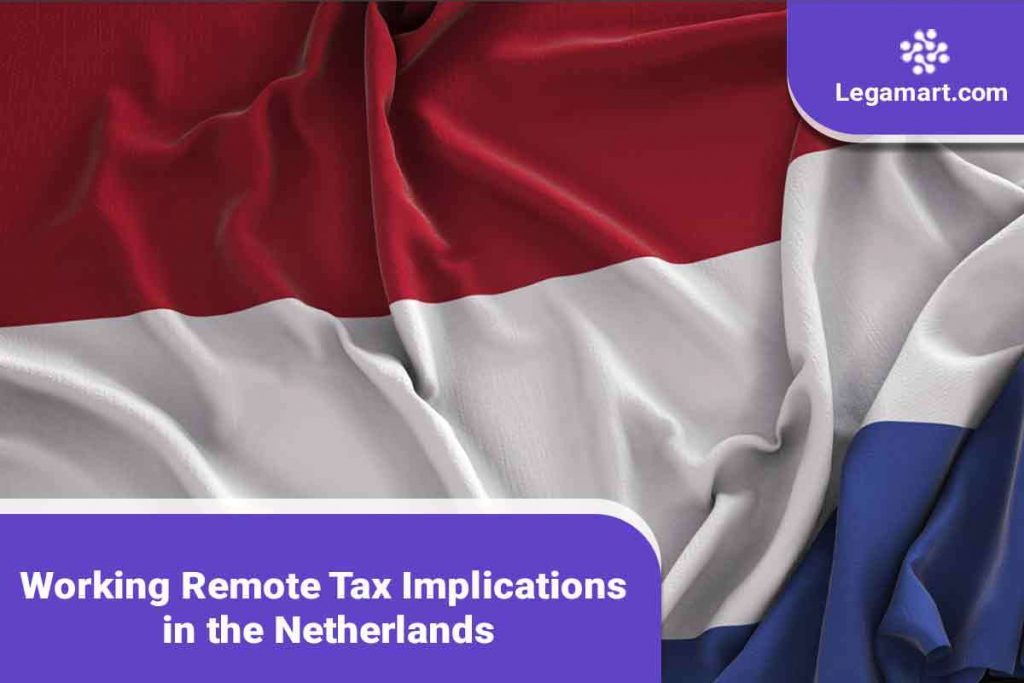Introduction
The COVID-19 epidemic has propelled innovations in remote and hybrid working in the Netherlands, as in many other nations. Before the COVID-19 outbreak in the Netherlands, 39% of the working population worked from home occasionally. Employees in the Netherlands are expected to work from home as much as possible since the onset of the corona epidemic. By the end of 2020, this figure would have risen to 48% (approximately 3.5 million employees).
Because remote and hybrid working has grown in popularity during the epidemic, the legal framework in the Netherlands has lagged, and companies may need to fill the gap with their regulations. One of them is, without a doubt, the working remote tax implications in the Netherlands. This article aims to reveal all of the issues that a person may deal with when working remote tax implications in the Netherlands, or, to put it another way, tax implications in the Netherlands.
Tax system in the Netherlands

The Dutch tax office is a Ministry of Finance department that will govern the tax implications in the Netherlands. The Belastingdienst is in charge of collecting taxes and social security payments. Tax revenues primarily fund government expenditures. Subsidies for the arts, culture, housing, childcare, healthcare, pensions, and social security benefits are all included.
Residency
For tax implications in the Netherlands, you might be entirely resident, partially resident, or non-resident, depending on your position. Because residency in the Netherlands is decided based on all relevant facts and circumstances, an employee’s residence may change due to remote working. If the facts and circumstances have changed due to remote working, employers and workers should rethink the employee’s resident status in the Netherlands.
According to Dutch legislation, personal circumstances will determine whether you are an official resident of the Netherlands. To establish your status, you must examine certain elements. For example, the length of your stay in the Netherlands, the location of your house and family, and your place of employment. In the Netherlands, the amount of tax you must pay is determined by your resident status. You can be classified into one of four groups.
Resident taxpayers
Suppose you are a resident taxpayer in the Netherlands. In that case, you will pay taxes on your total income, regardless of where you earn it, with the possibility of double taxation relief if tax is also owed in other countries. The IRS deems any company, employment, or investment profits or income taxable in the form of periodic rewards.
Non-resident taxpayers
As a non-resident taxpayer in the Netherlands, you will only pay tax on income earned. Employment income, business income, periodic benefits, income from real estate in the Netherlands, or a portion of ownership in a Dutch corporation are all examples. However, money received outside of the Netherlands may be taxed as well.
Qualifying non-residents taxpayers

If you live outside the Netherlands but pay taxes in the nation on most of your yearly income, you are a qualified non-resident taxpayer. You fall into this group if you live in an EU or EEA member state, Switzerland, or one of the Netherlands’ special municipalities (Bonaire, Saba, or Sint Eustatius).
You must pay taxes in the Netherlands on more than 90% of your worldwide income as a qualified non-resident taxpayer. This means you may take advantage of the same deductions, credits, and tax-free allowances as resident taxpayers.
Partial non-resident taxpayers
You can select the partial non-resident taxpayer status if you come to live in the Netherlands and are entitled to the 30% ruling advantage for new employees. If you hold this status, you are treated as a non-resident taxpayer for income tax purposes. If you choose this option, you will pay less tax in the Netherlands.
Income
According to the tax implications in the Netherlands, working from another country may impact not only your tax status but also the allowances and benefits to which you are entitled as a Dutch resident. The Dutch tax system categorizes various sources of taxable income into three categories, each with its rate, as follows:
1. Taxable income from profits, employment, and homeownership, including earnings, pensions, social benefits, and the value of the owner-occupied property. The WOZ value (Waardering Onroerende Zaken – Valuation of Immovable Property) is derived from the action used by municipalities to evaluate the value of houses and assets.
2. Taxable income from significant interest.
3. Taxable income from assets and savings.
When calculating their advantages from Netherlands-based assets and savings, non-resident taxpayers can claim a baseline allowance. In some cases, this may result in a reduced tax rate.
The Belastingdienst deducts a part of your monthly payment automatically. However, you must file a tax return at the end of each year and declare your income and assets. Under the working remote tax implications in the Netherlands, you’ll get a final tax notification and, in certain situations, a tax refund.
International Taxation

When you work for a Dutch employer and live in the Netherlands, your wage is fully taxed in the Netherlands (no cross-border situation). This may change if you begin working remotely from another nation according to the working remote tax implications in the Netherlands, and that country becomes your employment and residential state. In such circumstances, a cross-border issue occurs, and the applicable tax treaty must be reviewed.
Unless the employment is conducted in another nation, the tax implications in the Netherlands state that the employee will be taxed in the state of residency under most tax treaties (the “work state”). So, unless you physically exercise your work in another state, if your residence stays in the Netherlands, the tax implications in the Netherlands would tax your remuneration in the Netherlands.
If the job is performed in a country other than the Netherlands (“the work state”), the payment related to the working days in that other country is taxable in that other country. Following the working remote tax implications in the Netherlands, as the residence state, may, however, assess taxes on your overall wage (as well as the compensation relating to the work days in the other nation) if:
1. You labour for less than 183 days in the fiscal year or any twelve months beginning or ending in the fiscal year.
2. Your wage is paid by (or on behalf of) a non-resident of the work state.
3. Your income is not supported by a permanent enterprise owned by your company in the state of employment.
Suppose your residency changes as a result of remote working and the Netherlands no longer serves as your residency state. In that case, under the tax implications in the Netherlands, your remuneration will be taxed in the Netherlands to the extent that it is attributable to your working days in the Netherlands (i.e. the Netherlands has become your work state). Your pay balance will be taxed in your state of residence. As a result, your net income will be affected because each country has its national tax and tariff regulations. Remote working will not influence your discretionary income if you and your company have a net wage agreement.
Allowances and Reimbursements
Under the tax implications in the Netherlands, the 30% rule in the Netherlands benefits many foreigners. The 30% rule provides a tax-free allowance of up to 30% of the expat’s taxable wage. The 30% rule only applies to salaries taxable in the Netherlands. Suppose the remuneration becomes (partially) taxable in a nation other than the Netherlands due to remote working. In that case, the 30%-ruling advantage will be lesser or none following the working remote tax in the Netherlands, depending on the precise circumstances. Therefore, it is critical to be aware of this since it may impact your discretionary income.
Despite the change in facts and circumstances, the Dutch government has adopted budgetary steps in the tax implications in the Netherlands to guarantee that firms may continue to provide employees with the original tax-free fixed travel allowance. For 2020 and 2021, the Dutch state secretary decided that the tax-free restricted travel allowance be paid based on the previous travel pattern regardless of an employee’s modified travel pattern.
There are several concerns with remote work, particularly concerning the tax implications in the Netherlands, processing time, danger, and fraud. If you are considering working from home, there are solutions to deal with financial concerns that can help you with your remote job. Or, more simply, you can visit the LegaMart directory and employ a lawyer to grasp all the details you need regarding the working remote tax implications in the Netherlands based on your questions from your smartphone.
Why must you comply with Dutch payroll tax requirements?
Tax law in the Netherlands can be confusing. While some areas of the tax code are similar to other country laws (like the permanent establishment aspect), however, others are specific to Dutch law. Therefore, it is important to get a complete picture of the Dutch tax law before employing or getting employed as a Dutch worker, and even companies should avoid taking in remote workers without having the complete information, as required.
Triggering permanent establishment in the Netherlands
The Netherlands often strictly imposes the Organisation for Economic Cooperation and Development (OECD) guidelines for a permanent establishment. A company’s location is a major trigger for the permanent establishment, especially if the company is making or selling something in the Netherlands.
However, can permanent establishment also be triggered if a company representative is working from the country?
If the worker in the Netherlands is in a “contracting state”, i.e., they are doing business on behalf of the company and in the name of the company, this is enough for triggering the aspect of permanent establishment risk. This is especially the case if they are specifically working for your organization (even though co-employment doesn’t necessarily impact the permanent establishment risk).
For example, a designer, engineer, or salesperson can trigger permanent establishment — even if they’re not working in isolation for your organization. There are stiff penalties for non-compliance; hence, the risks must be taken seriously.
If the Netherlands has identified your company to have a permanent establishment and you are not meeting the required taxation obligations, this can be considered to be tax evasion, or tax fraud. These crimes bring huge fines and sometimes even jail time, apart from the public relations nightmare.
Therefore, before looking to work with Dutch employees or contractors on a remote basis, prefer to consult an Employer of Record, which has a team of internal local experts, for cases where you do not own a legal entity in the Netherlands.
Conclusion
Under the tax implications in the Netherlands, the problem becomes more complicated when a Dutch employee works remotely from another nation. The underlying rule is that under the ‘pay, as you earn’ tax system, companies continue to compute and deduct income tax from all payments made to Dutch employees temporarily working overseas. Furthermore, such an employee may be required to pay income tax in the host nation.
Regarding the working remote tax implications in the Netherlands, allowing an employee to work abroad mistakenly constitutes a permanent establishment for corporation tax purposes in that nation. Depending on the government in which an employee works and the time they will be working in that country, an employer may also be compelled to continue deducting social security contributions from their wages.
Uncover the steps and procedures for immigration to different nations, with a focus on Turkey to Norway and US to Portugal, in Legamart’s insightful articles.




